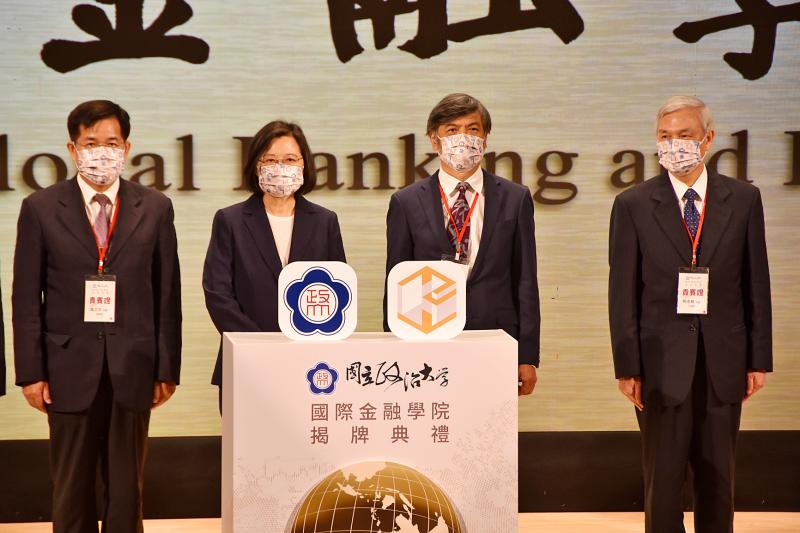President Tsai Ing-wen (蔡英文) yesterday encouraged the government, the private sector and academia to work together to develop and internationalize Taiwan’s financial sector by cultivating a local talent pool.
Speaking at a launch ceremony for National Chengchi University’s (NCCU) College of Global Banking and Finance, Tsai said that sound economic growth had enabled Taiwan to have good credit ratings and report solid foreign exchange reserves, creating a good foundation for the country to develop international finance at a time when the financial industry is becoming more global.
On April 29, S&P Global Ratings raised its long-term issuer credit rating for Taiwan from “AA” to “AA+,” saying that the outlook for the country’s economic performance was favorable based on robust demand for its electronics exports.

Photo: Wu Po-hsuan, Taipei Times
At the end of last month, Taiwan’s foreign exchange reserves fell by US$3.71 billion from a month earlier to US$545.06 billion, because of intervention by the central bank to prevent the New Taiwan dollar from losing value.
However, the country was ranked the fourth-largest forex reserve holder in the world, up one place from a month earlier.
In the post-COVID-19 era, Taiwan should cultivate a pool of banking talent to enable the local financial industry to speed up its efforts to meet international standards with assistance from NCCU’s College of Global Banking and Finance, Tsai said.
Taiwan should aim to become a finance hub for enterprises in Asia, as well as a center for wealth management for people with significant assets in the region, she said.
High-ranking government officials such as Minister of Finance Su Jain-rong (蘇建榮), central bank Governor Yang Chin-long (楊金龍) and Financial Supervisory Commission Vice Chairwoman Chiu Shu-chen (邱淑貞) also attended the NCCU ceremony, as did representatives from 27 financial institutions.
Tsai said that the presence of these attendees demonstrated Taiwan’s collective effort at becoming a regional financial hub, with the public and private sectors, and academia willing to pour resources into the college.
The new college is the second international finance department in Taiwan to be opened, the Presidential Office said in a statement.
The president last month attended the inauguration of the School of International Finance at National Sun Yat-sen University.
The NCCU college, which is bilingual, is to focus on four areas — international asset management; financial innovations; environment, social and governance; and inclusive financing and legal compliance — and is expected to create a new higher education teaching model by integrating theory with practice, Tsai said.
Inclusive financing is aimed at promoting the availability of banking services to the broadest segment of society at affordable terms.

A year-long renovation of Taipei’s Bangka Park (艋舺公園) began yesterday, as city workers fenced off the site and cleared out belongings left by homeless residents who had been living there. Despite protests from displaced residents, a city official defended the government’s relocation efforts, saying transitional housing has been offered. The renovation of the park in Taipei’s Wanhua District (萬華), near Longshan Temple (龍山寺), began at 9am yesterday, as about 20 homeless people packed their belongings and left after being asked to move by city personnel. Among them was a 90-year-old woman surnamed Wang (王), who last week said that she had no plans

China might accelerate its strategic actions toward Taiwan, the South China Sea and across the first island chain, after the US officially entered a military conflict with Iran, as Beijing would perceive Washington as incapable of fighting a two-front war, a military expert said yesterday. The US’ ongoing conflict with Iran is not merely an act of retaliation or a “delaying tactic,” but a strategic military campaign aimed at dismantling Tehran’s nuclear capabilities and reshaping the regional order in the Middle East, said National Defense University distinguished adjunct lecturer Holmes Liao (廖宏祥), former McDonnell Douglas Aerospace representative in Taiwan. If

TO BE APPEALED: The environment ministry said coal reduction goals had to be reached within two months, which was against the principle of legitimate expectation The Taipei High Administrative Court on Thursday ruled in favor of the Taichung Environmental Protection Bureau in its administrative litigation against the Ministry of Environment for the rescission of a NT$18 million fine (US$609,570) imposed by the bureau on the Taichung Power Plant in 2019 for alleged excess coal power generation. The bureau in November 2019 revised what it said was a “slip of the pen” in the text of the operating permit granted to the plant — which is run by Taiwan Power Co (Taipower) — in October 2017. The permit originally read: “reduce coal use by 40 percent from Jan.

‘SPEY’ REACTION: Beijing said its Eastern Theater Command ‘organized troops to monitor and guard the entire process’ of a Taiwan Strait transit China sent 74 warplanes toward Taiwan between late Thursday and early yesterday, 61 of which crossed the median line in the Taiwan Strait. It was not clear why so many planes were scrambled, said the Ministry of National Defense, which tabulated the flights. The aircraft were sent in two separate tranches, the ministry said. The Ministry of Foreign Affairs on Thursday “confirmed and welcomed” a transit by the British Royal Navy’s HMS Spey, a River-class offshore patrol vessel, through the Taiwan Strait a day earlier. The ship’s transit “once again [reaffirmed the Strait’s] status as international waters,” the foreign ministry said. “Such transits by